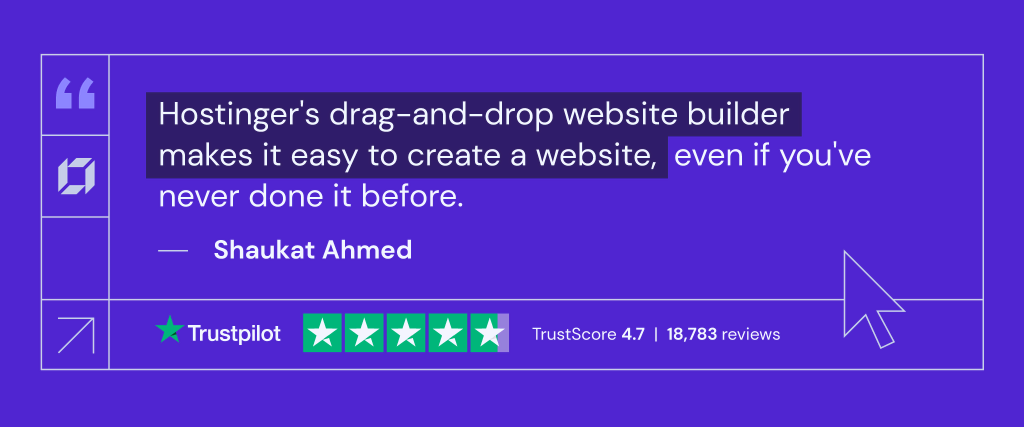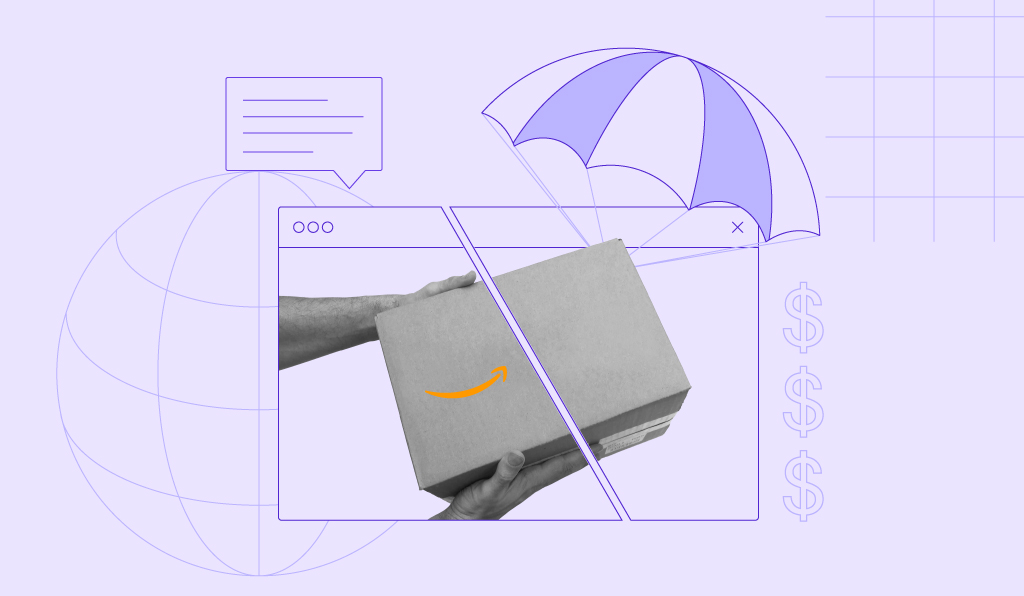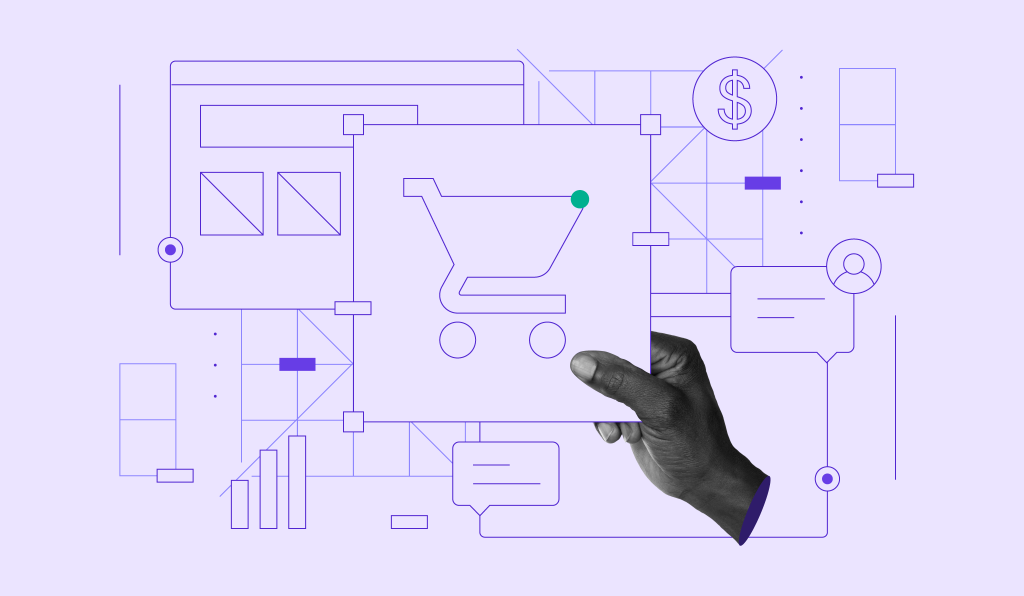The best sites to sell online: 9 marketplaces for selling goods or running a business
Selling products online is a lucrative way to earn money, whether you’re starting a new business or looking for extra income. The key to success lies in choosing the right platform that matches your product type and target audience.
In this article, we explore the top online marketplaces and platforms that cater to different business needs, from casual sellers to large-scale operations.
We’ll also discuss how you can build your own online store with Hostinger Website Builder, offering complete control over your sales without third-party fees or commissions.
9 best sites to sell online
Use this list for a quick overview on how different sites suit different businesses:
| Platform | Ideal for | Key features | Fees |
| Amazon | Reaching a massive, diverse audience | Access to millions of customers, powerful tools for brand management | $0.99/item or $39.99/month + referral fees |
| eBay | Selling items via auction or secondhand goods | Auction system, global reach | 10-15% final value fee + $0.35/item after 250 listings |
| Etsy | Artisans and crafters selling unique products | Specialized marketplace for crafts and vintage products | $0.20/item + 6.5% transaction fee |
| Bonanza | Small businesses with unique or niche products | Easy synchronization with other platforms | $14.99 account setup fee + $0.25 transaction fee + 3.5% final offer value fee |
| eBid | Budget-conscious sellers using auction formats | Lower fees compared to competitors | 5% final value fee or 0% with SELLER+ plan |
| Ruby Lane | Sellers of antiques and high-end collectibles | Niche market for vintage items | $45/month + 2.5-9.9% service fee |
| Poshmark | Fashion and home goods sellers using social media | User-friendly app, social selling features | 20% for sales over $15, $2.95 for sales under $15 |
| Facebook Marketplace | Casual sellers focusing on local or social sales | Easy to list, large user base | 5% fee for shipments over $8, or $0.40 flat fee |
| Craigslist | Selling locally with zero costs | Simple listings, no registration required | Free for most categories |
| Hostinger Website Builder | Entrepreneurs wanting full control and custom branding | All-in-one solution, cost-effective, easy to use | Starting from RM8.99/month (no additional fees) |
1. Amazon

Amazon is an excellent platform for those looking to reach a broad audience and sell a variety of products. Amazon’s infrastructure supports everything from small personal sellers to large-scale enterprises, making it a versatile choice for many.
However, the convenience of Amazon comes with significant costs, including listing fees, referral fees, and potentially high advertising costs. The standard selling plans start at $0.99 per item or $39.99 per month for a professional account, with additional referral fees ranging from 8% to 45%.
Pros:
- Massive customer base. Reach millions of potential buyers globally.
- Branding tools. Utilize the Amazon Brand Registry if you have a trademarked brand.
- Advanced selling features. Access to inventory management and advertising tools.
Cons:
- High competition. You’ll be competing with millions of other sellers, including Amazon’s own products.
- Fees. The various fees can significantly reduce your profit margins.
2. eBay

eBay has long been a staple in the online selling community, especially for those interested in auction-based sales and secondhand goods. It’s a versatile platform that caters to both casual sellers and businesses, offering a wide range of product categories.
eBay’s fees include a 10-15% final value fee on most sales, with the first 250 listings each month being free. After that, a $0.35 insertion fee applies per item.
Pros:
- Auction model. Set starting prices and let buyers bid, which can drive up the final sale price.
- Global reach. Access to buyers from all over the world.
- Seller protection. eBay offers protection policies to ensure transactions are secure.
Cons:
- Fee structure. Fees can add up, especially if you’re listing many items.
- Reputation for budget shopping. This might not be the best platform for luxury or high-end products.
3. Etsy

Etsy is the go-to platform for artisans and crafters looking to sell handmade items, vintage goods, or craft supplies. It’s a niche marketplace that attracts a dedicated audience interested in unique, often one-of-a-kind products.
Etsy charges $0.20 per listing plus a 6.5% transaction fee on each sale. Payment processing fees also vary by location.
If you’re new to selling handmade products online, check out our guide on how to start a business to ensure you’re covering all your bases.
Pros:
- Niche audience. Ideal for sellers of handmade or vintage items.
- Built-in community. Etsy has a strong community of buyers and sellers who are passionate about unique goods.
- Social media integration. Easy to promote products on platforms like Facebook and Instagram.
Cons:
- Competition. The growing number of sellers can make it challenging to stand out.
- Additional fees. Off-site ads and payment processing fees can add up.
4. Bonanza

Bonanza may not be as well-known as some of the larger marketplaces, but it’s a strong contender for independent sellers looking for a user-friendly platform. Bonanza specializes in unique products and offers easy integration with other platforms like eBay and Amazon.
While Bonanza doesn’t charge for listings, new sellers are required to pay an account set-up fee of $14.99. The platform also charges a $0.25 transaction fee on all sales made without an active membership subscription.
There’s also a 3.5% final offer value fee for each sale. Sellers can also choose to pay for additional exposure through various advertising options.
Pros:
- Easy integration. Sync your Bonanza store with eBay, Amazon, or Etsy.
- Advertising options. Flexible advertising fees based on how much exposure you want.
Cons:
- Less traffic. Bonanza isn’t as widely recognized as other platforms. This can potentially hinder sales and growth for new sellers due to fewer potential customers, lower visibility, slower sales, and difficulty building a reputation.
- Limited inventory space. Most sellers are limited to 75,000 items.
5. eBid

eBid is a great alternative to eBay for sellers who prefer an auction-based platform but want to avoid higher fees. It offers similar auction-style listings but at a fraction of the cost.
eBid’s fee structure is simple: a 5% final value fee on sales, with an option to upgrade to a higher plan for 0% final fees.
Pros:
- Low fees. eBid charges just a 5% final value fee, or 0% with the higher plans, offering substantial savings compared to other platforms.
- Bulk listing tools. eBid’s Ninja Lister tool allows sellers to upload large quantities of items quickly and efficiently, which is ideal for those with extensive inventories.
- Global reach. While not as large as eBay, eBid still offers access to an international market, which can be beneficial for sellers looking to expand their reach.
Cons:
- Smaller user base. eBid has a more limited audience compared to major competitors like eBay and Amazon, which could result in slower sales.
- Limited customer support. The platform primarily relies on a help center and ticket submission for support, which may be insufficient for sellers who require more immediate assistance.
6. Ruby Lane

Ruby Lane is a niche marketplace designed for sellers of antiques, collectibles, and vintage items. It caters to a specific audience, making it a great option for sellers with high-quality, curated products.
Ruby Lane charges a $45 monthly maintenance fee and a 2.5-9.9% service fee on sales, depending on the sale value. It’s important to understand these costs before committing to the platform.
To ensure you’re setting competitive prices on your antique items, check out our article on how to price a product.
Pros:
- Targeted audience. Ruby Lane attracts buyers specifically interested in antiques and collectibles, increasing your chances of making sales.
- Promotion opportunities. Sellers who regularly add new items and use the platform exclusively can get featured on the homepage, boosting visibility.
- Negotiation features. Buyers can submit offers on items, allowing sellers to accept or decline based on preset criteria – ideal for high-demand or valuable items.
Cons:
- Monthly fees. The maintenance fee can be costly, especially for startups with small inventories or budgets.
- Complicated shipping. Ruby Lane lacks a built-in free shipping option, requiring sellers to manually adjust order totals for free shipping.
7. Poshmark

Poshmark is a popular platform for selling fashion, beauty, and home decor items. It combines eCommerce with social networking, making it easy for sellers to connect with buyers through shared interests.
Poshmark charges a 20% fee on sales over $15, or a flat $2.95 for sales under $15. The platform’s app-based interface is particularly user-friendly, resembling social media platforms like Instagram.
Pros:
- Social selling features. Poshmark’s community-based approach allows sellers to participate in virtual selling events, known as Posh Parties, where they can showcase their items to a targeted audience for a limited time.
- Pre-paid shipping labels. After a sale, Poshmark provides sellers with a pre-paid, pre-addressed shipping label, simplifying the logistics and reducing the risk of shipping errors.
- Price drop notifications. If you lower the price of an item by at least 10%, Poshmark automatically alerts any users who have liked the item, encouraging them to make a purchase.
Cons:
- High fees. The commission on sales over $15 can be steep, especially for those selling higher-value items, where the fees can significantly impact your profits.
- Weight limits. The platform’s pre-paid shipping labels cover packages up to 5 lbs. If your package exceeds this weight, you’ll need to pay extra, which can cut into your profits.
8. Facebook Marketplace

Facebook Marketplace is a free, easy-to-use platform that leverages Facebook’s massive user base. It’s ideal for local sales but also offers online selling options in certain regions.
Facebook Marketplace doesn’t charge for listings, but if you choose to ship items, there’s a 5% fee for sales over $8 or a $0.40 flat fee for lower-priced items.
Pros:
- No listing fees. Facebook Marketplace is free to use, with fees only applying if you choose to ship items to buyers outside your local area.
- Massive audience. With billions of users worldwide, Facebook gives you access to a vast potential customer base.
- Real-time communication. Sellers can interact with potential buyers directly through Facebook Messenger, which can help close sales quickly.
Cons:
- No seller protection. Facebook Marketplace doesn’t offer the same level of protection for sellers as other platforms, so it’s important to vet buyers and handle transactions carefully.
- Limited reach for niche items. While Facebook Marketplace is great for general items, it may not be the best platform for selling niche or specialized products.
9. Craigslist

Craigslist is a no-frills platform that’s been around for decades. It’s primarily used for selling items locally. Listing items on Craigslist is free in most categories, making it a great option for those who want to avoid fees altogether.
Craigslist doesn’t offer payment processing or shipping services, so transactions are typically completed in person.
Pros:
- Free to use. Craigslist charges no fees for most listings, making it a cost-effective option.
- Easy listings. Sell online fast thanks to the simple design for hassle-free posting.
- Anonymous posting. Post items anonymously to protect your privacy.
Cons:
- Local reach. Craigslist is primarily suited for local sales, limiting broader market access.
- No protection. Lacks buyer and seller protection, so transactions on this online marketplace require caution.
- Limited features. Missing advanced tools like analytics and promotions can hinder scaling.
Build your own online store with Hostinger Website Builder
Creating your own eCommerce website with a tool like Hostinger Website Builder is a smart way to sell online directly to customers. Unlike with an online marketplace, you remain in full control over your business and can maximize your profits.
Unlike selling on third-party platforms, where fees can quickly add up, a website builder provides a cost-effective solution without any hidden charges. Hostinger Website Builder has various built-in AI tools to help streamline everything from site layout creation to writing product descriptions, creating unique images, and more.
Build and publish your online store in an afternoon from just RM8.99/month.
Some of the main reasons for building your own store include the following:
- Complete control. Customize your store’s design, branding, and product pages to ensure your business stands out. You’re not tied to the rules or restrictions of a third-party marketplace.
- No extra fees. Hostinger doesn’t charge listing or commission fees, so every sale you make is more profitable. This can significantly increase your margins compared to platforms that take a cut of your revenue.
- User-friendly setup. With a drag-and-drop website builder, you can quickly set up your store even without prior coding experience. Hostinger Website Builder is designed to be intuitive and straightforward, helping you focus on your business, rather than web development.
Considerations:
- Marketing effort. You need to invest time in marketing to drive traffic to your site, as you won’t have the built-in customer base that large marketplaces offer. A solid digital marketing strategy will be essential to attract and retain customers.
Want to learn more? Take a look at our in-depth tutorial on how to build an online store with a website builder.
Conclusion
Selecting the best online marketplace depends on your needs and business goals.
Casual sellers might prefer platforms like Facebook Marketplace for its ease of use and flexibility.
Small businesses looking to grow may find Bonanza appealing due to its lower fees and promotional options.
Larger businesses aiming for extensive reach, Amazon offers vast market access, though with higher costs.
The type of product you sell also matters – niche markets thrive on platforms like Ruby Lane and Etsy, while eBay offers versatility for a wide range of items.
Building your online store with a website builder is an excellent choice if you seek full control and higher profit margins. Though it requires more effort upfront, it allows you to create a unique brand and stand out from the competition.

Online selling sites FAQ
What are the best online selling platforms?
The best eCommerce platforms vary depending on your needs. Amazon is great for sellers looking to reach a global audience and leverage Amazon’s logistics. eBay is ideal for selling unique, collectible, or second-hand items with the option for auctions. Etsy is perfect for artisans selling handmade or vintage goods. Facebook Marketplace and Nextdoor are excellent for local, casual sales and community interactions. Choose a platform based on your target audience, product type, and desired level of control over the sales process.
Are there any free online selling sites?
Yes, platforms like Craigslist, Nextdoor, and Facebook Marketplace allow you to list products for free. These platforms are ideal for casual sellers looking to avoid listing fees. While these platforms are free for most transactions, some may have optional payment processing or shipping fees.
Which selling platform has the lowest fees?
Craigslist is the online selling platform with the lowest fees for most categories, generally charging zero commission fees. However, it lacks online payment processing, meaning transactions must occur in person. Facebook Marketplace and Nextdoor also allow free listings, but depending on how the transaction is completed, they might charge for shipping or online payment processing.




Comments
March 08 2022
Thanks! I sell products via Facebook and use a browser extension like cucomm. It automatically sends messages to users and can add them as friends. I advise you to try and make sure.